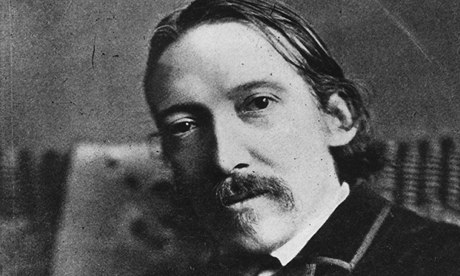With so much literary content available for free online, it's a relief when someone cherry-picks the things worth reading
Robert Louis Stevenson's early years, as described by his mother, is among the highlights of the Public Domain Review. Photograph: Hulton Archive/Getty Images
When the Tolstoy museum in Moscow put out a call for proofreaders to help turn the novelist's complete works into ebooks, they were taken aback by the global response: "No one expected that in the first 10 days, thousands of volunteers would read 90 volumes."
They needn't have been so surprised. There is a long and heart-warming tradition of people willing to sacrifice their time in the pursuit of universal access to human knowledge. Project Gutenberg, the original volunteer-led book digitisation programme, has been going since 1971 and boasts more than 42,000 out-of-copyright works. The Internet Archive has made more than 5m ebooks freely available.
It's possible to become the world's best read person, or research an entire PhD, without spending any money or even moving from the sofa. But what if you're not sure what you're looking for? I can't be the only sufferer of public domain paralysis: that overwhelming feeling of too much choice. Or what if you're after some quality control? Life's too short for dodgy translations of Anna Karenina.
Step forward the magnificent Public Domain Review, a project of the Open Knowledge Foundation. Founded by Adam Green and Jonathan Gray, the site and its newsletter showcase the best and quirkiest texts, images and films the internet has to offer. When scouring online archives for books, Green sees his role as "creating some sort of ideal library, or at least the weirder miscellaneous section". A favourite discovery was Stevenson's Baby Book, a record of Robert Louis Stevenson's early years written by his mother.
It sits on a virtual bookshelf alongside handsome editions of titles you will have heard of (Diary of a Nobody, Montaigne's essays) and ones you probably haven't (Letters from a Cat, Croatian fairytales, a dictionary of Victorian slang from 1909). A model of digital curation.
They needn't have been so surprised. There is a long and heart-warming tradition of people willing to sacrifice their time in the pursuit of universal access to human knowledge. Project Gutenberg, the original volunteer-led book digitisation programme, has been going since 1971 and boasts more than 42,000 out-of-copyright works. The Internet Archive has made more than 5m ebooks freely available.
It's possible to become the world's best read person, or research an entire PhD, without spending any money or even moving from the sofa. But what if you're not sure what you're looking for? I can't be the only sufferer of public domain paralysis: that overwhelming feeling of too much choice. Or what if you're after some quality control? Life's too short for dodgy translations of Anna Karenina.
Step forward the magnificent Public Domain Review, a project of the Open Knowledge Foundation. Founded by Adam Green and Jonathan Gray, the site and its newsletter showcase the best and quirkiest texts, images and films the internet has to offer. When scouring online archives for books, Green sees his role as "creating some sort of ideal library, or at least the weirder miscellaneous section". A favourite discovery was Stevenson's Baby Book, a record of Robert Louis Stevenson's early years written by his mother.
It sits on a virtual bookshelf alongside handsome editions of titles you will have heard of (Diary of a Nobody, Montaigne's essays) and ones you probably haven't (Letters from a Cat, Croatian fairytales, a dictionary of Victorian slang from 1909). A model of digital curation.

No comments:
Post a Comment